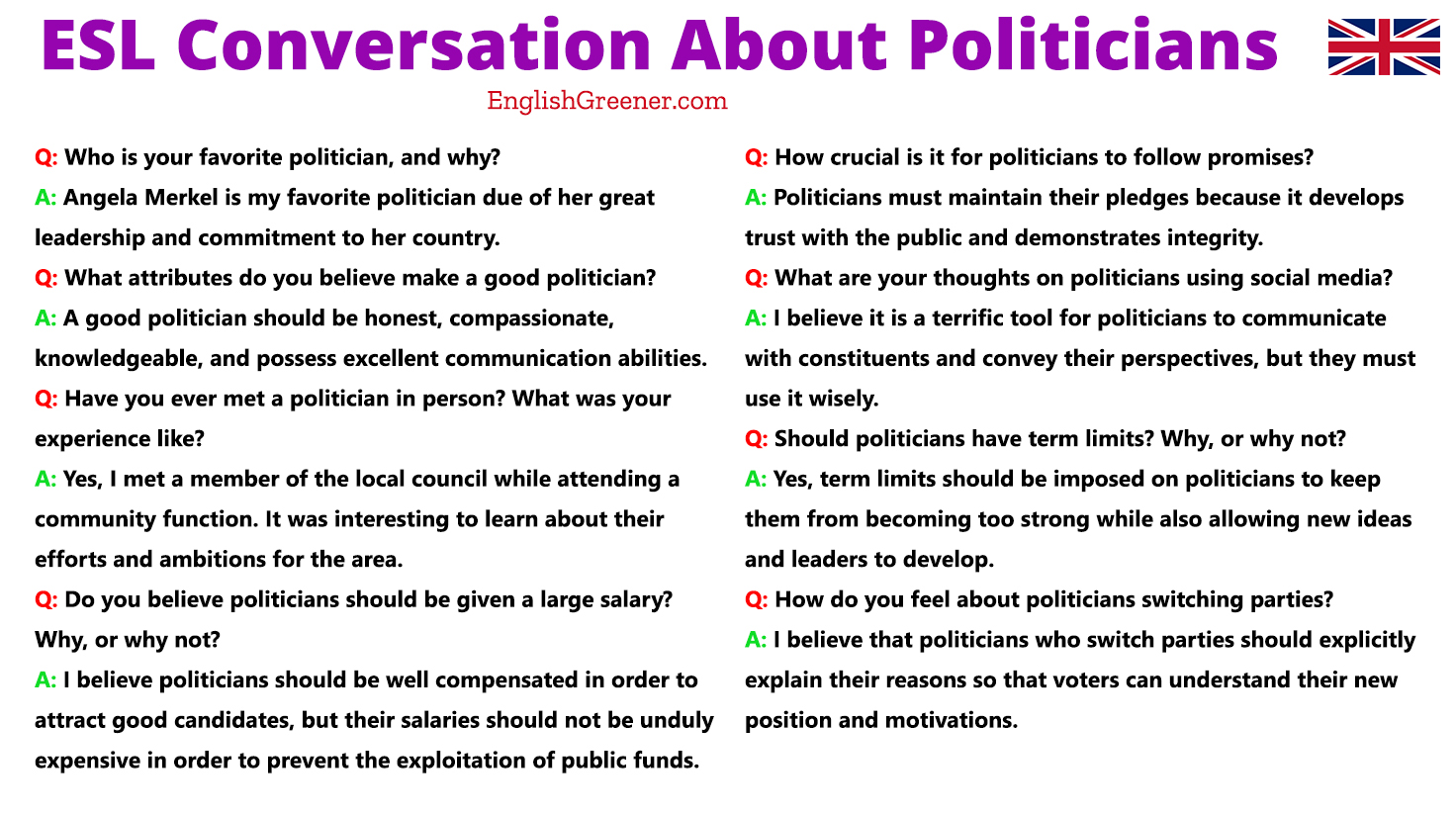Your cart is currently empty!

ESL English Conversation Questions and Answers about Politicians
This set of 20 ESL English conversation questions and answers focuses on the issue of politicians and is intended to help learners practice speaking, listening, and understanding English. The questions cover a wide range of topics, including the characteristics of good politicians, encounters with politicians, perspectives on their roles and responsibilities, and concerns such as term limits, party switching, and dealing with criticism. Each question is accompanied by an example answer, which serves as a model response and encourages students to express their own ideas and experiences. This practice improves vocabulary and grammar abilities while also encouraging lively discussions about political leadership, honesty, and public service.
Question: Who is your favorite politician, and why?
Answer: Angela Merkel is my favorite politician due of her great leadership and commitment to her country.
Question: What attributes do you believe make a good politician?
Answer: A good politician should be honest, compassionate, knowledgeable, and possess excellent communication abilities.
Question: Have you ever met a politician in person? What was your experience like?
Answer: Yes, I met a member of the local council while attending a community function. It was interesting to learn about their efforts and ambitions for the area.
Question: Do you believe politicians should be given a large salary? Why, or why not?
Answer: I believe politicians should be well compensated in order to attract good candidates, but their salaries should not be unduly expensive in order to prevent the exploitation of public funds.
Question: How crucial is it for politicians to follow promises?
Answer: Politicians must maintain their pledges because it develops trust with the public and demonstrates integrity.
Question: What are your thoughts on politicians using social media?
Answer: I believe it is a terrific tool for politicians to communicate with constituents and convey their perspectives, but they must use it wisely.
Question: Should politicians have term limits? Why, or why not?
Answer: Yes, term limits should be imposed on politicians to keep them from becoming too strong while also allowing new ideas and leaders to develop.
Question: How do you feel about politicians switching parties?
Answer: I believe that politicians who switch parties should explicitly explain their reasons so that voters can understand their new position and motivations.
Question: What role do you believe politicians should play in solving climate change?
Answer: Politicians should take the lead in combating climate change by developing and enforcing environmentally sound legislation.
Question: Do you think politicians can really make a difference in people’s lives? Why, or why not?
Answer: Yes, I believe that politicians can have a significant impact by enacting laws and policies that promote education, healthcare, and economic possibilities.
Question: How essential is a politician’s personal life in relation to their professional role?
Answer: A politician’s personal life can reflect their character, but their professional decisions and actions should take precedence.
Question: Do you believe politicians should have previous experience in government? Why, or why not?
Answer: Previous government experience can benefit politicians by providing them with vital expertise and understanding of the system.
Question: What are your thoughts on politicians taking donations from huge corporations?
Answer: I am concerned that politicians accepting money from huge corporations would lead to conflicts of interest and affect their judgments.
Question: What do you believe is the most difficult aspect of being a politician?
Answer: The most difficult aspect of being a politician is balancing the wants and interests of many groups while making decisions that benefit the majority.
Question: Do you believe young people should become more involved in politics? Why, or why not?
Answer: Young people should be more involved in politics because they provide new viewpoints and are the future leaders of our society.
Question: How do you feel about politicians that put their own interests ahead of the public’s?
Answer: I am disappointed and angry with politicians who prioritize their own interests over the public’s.
Question: How can politicians acquire the trust of the public?
Answer: Politicians may acquire the public’s trust by being open, honoring their commitments, listening to constituents’ problems, and acting with integrity.
Question: How do you believe politicians should handle criticism?
Answer: Politicians should respond to criticism constructively by soliciting feedback, resolving problems, and making required reforms.
Question: What are your thoughts on politicians with backgrounds in business?
Answer: Politicians with commercial experience can provide valuable management and economic abilities, but they must also consider public service ethics.
Question: How vital is it for politicians to collaborate with others, including those from other parties?
Answer: In order to develop successful and comprehensive policies, politicians must collaborate with others, especially those from opposite parties.
